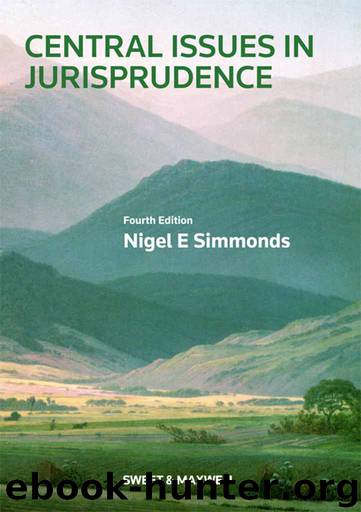Central Issues in Jurisprudence by Nigel E. Simmonds

Author:Nigel E. Simmonds [Simmonds, Nigel E.]
Language: eng
Format: mobi
Tags: ebook, book
Publisher: Sweet & Maxwell
Published: 2013-01-21T05:00:00+00:00
1. The law is never morally conclusive. Even given that the law requires that I act in a certain way, it remains an open question whether morally I ought to act in that way. The existence of the law may affect the morality of the action, but it does not conclusively determine it.
2. The mere fact that a rule is a just and good rule does not make it a law. To be a law, it must emanate from an authorised source. Equally, the fact that a rule is unjust does not show that it is not a law, if the rule does in fact emanate from an authorised source.
These two claims are close to the heart of legal positivism, and explain much of that theory’s plausibility. But they can be interpreted in a way that is consistent with the claim that the internal point of view is a judgment of the law’s moral bindingness, and that propositions of law are a type of moral judgment.
If we reflect on Hart’s account of the need for a rule of recognition to provide the certainty that is lacking in a society with primary rules alone, we will see that the positivist view of law as publicly ascertainable rules reflects an important moral dimension of the law. If we accept the need for publicly ascertainable rules, and we accept that legal rules are publicly ascertainable, we may feel that the whole point of having laws will be defeated if people are willing to comply with the law only when they consider it to be just. We can view the law as binding us morally even when we disapprove of its content. Thus, the claim that legal obligation is a type of moral obligation is quite consistent with the positivist idea that law is law, be it just or unjust. Since the basis of the moral obligation lies in law’s publicly ascertainable nature, the claim is also consistent with the idea that laws must emanate from authoritative sources, and that being “just” is not enough to make a rule into a law. Since any moral obligation may be overridden by conflicting obligations, the claim that legal obligation is a type of moral obligation is also consistent with the idea that the law is never completely conclusive of what we morally ought to do: there may be circumstances when it is our moral duty to break the law.
The starting point for our discussion was the contrast between the reductive external view of the legal order as a system of power, sanctions and threats, and the internal view (of the lawyer, the judge and most citizens) of the law as imposing obligations, conferring rights, and so on. The conclusion we are now considering is that the internal point of view is best understood as a particular moral attitude towards the law: not necessarily moral approval of the law’s content, but moral acceptance of the general obligation to comply with publicly ascertainable legal rules. Propositions of law are, on this view, not morally neutral.
Download
This site does not store any files on its server. We only index and link to content provided by other sites. Please contact the content providers to delete copyright contents if any and email us, we'll remove relevant links or contents immediately.
American Kingpin by Nick Bilton(3886)
Future Crimes by Marc Goodman(3598)
The Meaning of the Library by unknow(2571)
Inside the Middle East by Avi Melamed(2356)
Why Nations Fail: The Origins of Power, Prosperity, and Poverty by Daron Acemoglu & James Robinson(2297)
On Tyranny by Timothy Snyder(2231)
Living Silence in Burma by Christina Fink(2071)
Putin's Labyrinth(2022)
The Mastermind by Evan Ratliff(1937)
The Smartest Kids in the World by Amanda Ripley(1856)
Think Like a Rocket Scientist by Ozan Varol(1820)
Law: A Very Short Introduction by Raymond Wacks(1747)
It's Our Turn to Eat by Michela Wrong(1731)
The Rule of Law by Bingham Tom(1698)
Philosophy of law a very short introduction by Raymond Wacks(1670)
Leadership by Doris Kearns Goodwin(1638)
A Dirty War by Anna Politkovskaya(1630)
Information and Communications Security by Jianying Zhou & Xiapu Luo & Qingni Shen & Zhen Xu(1621)
Civil Procedure (Aspen Casebooks) by Stephen C. Yeazell(1556)
